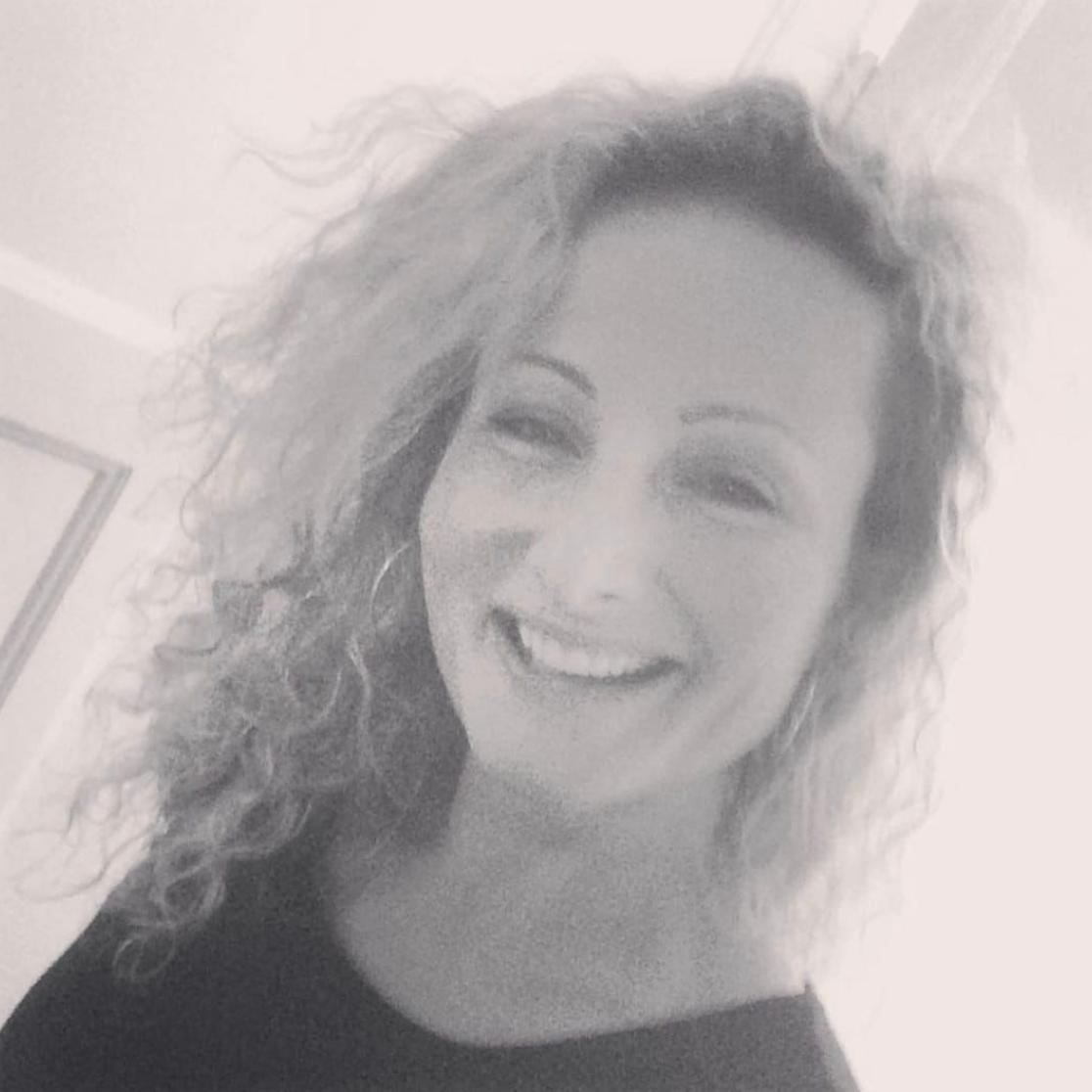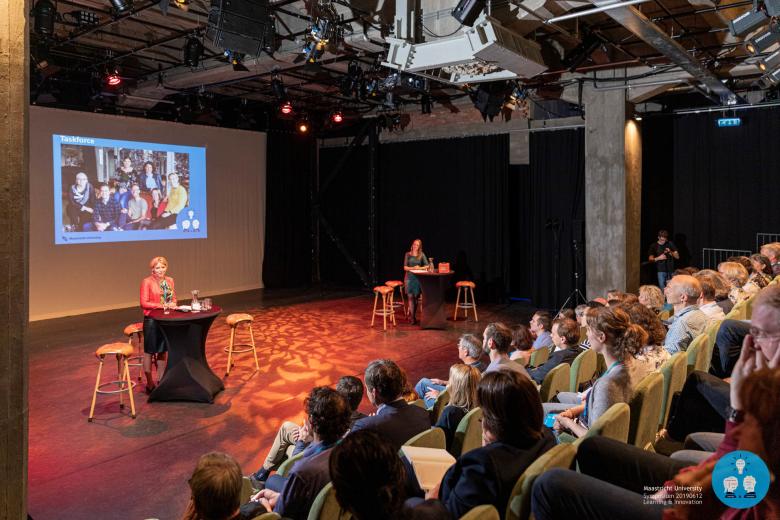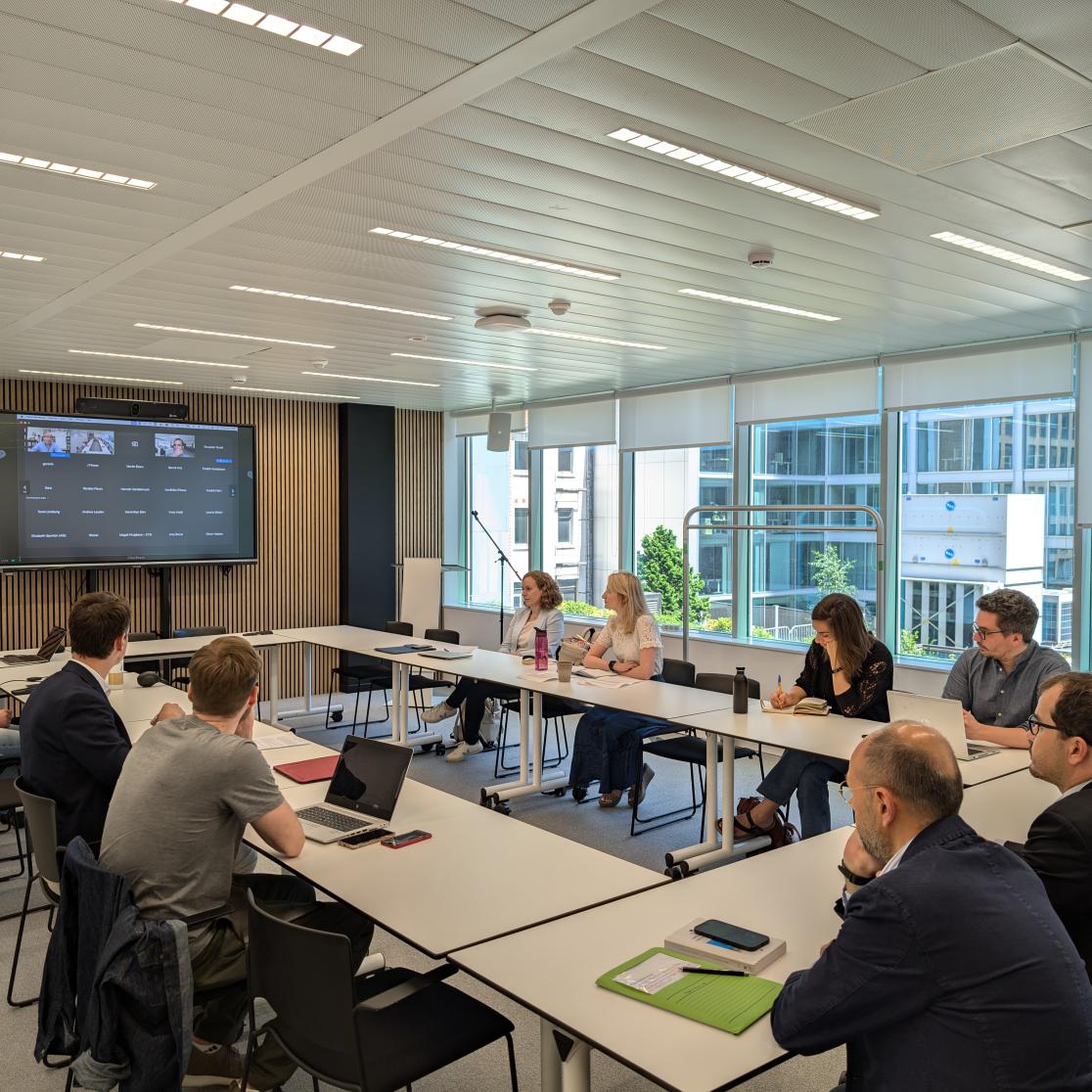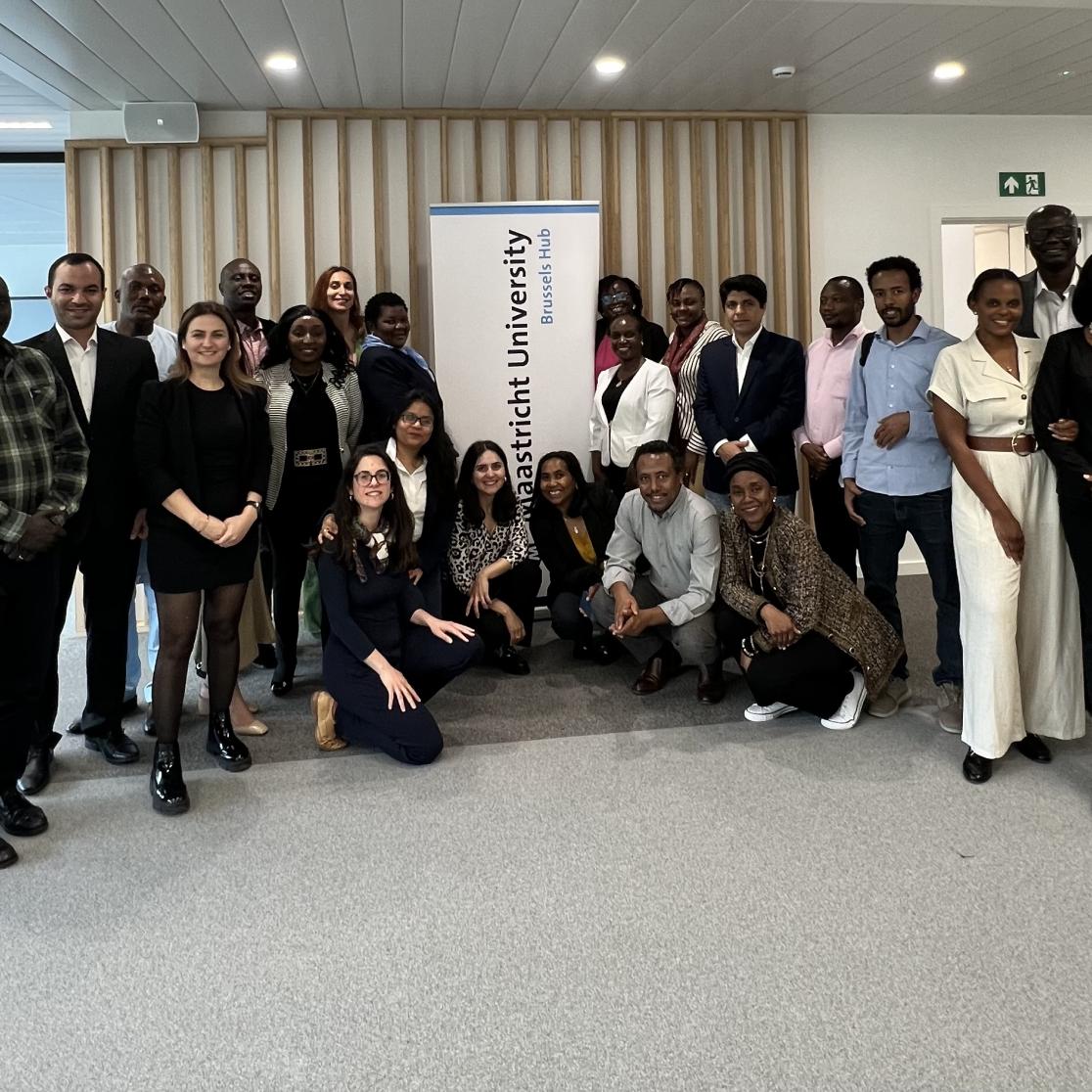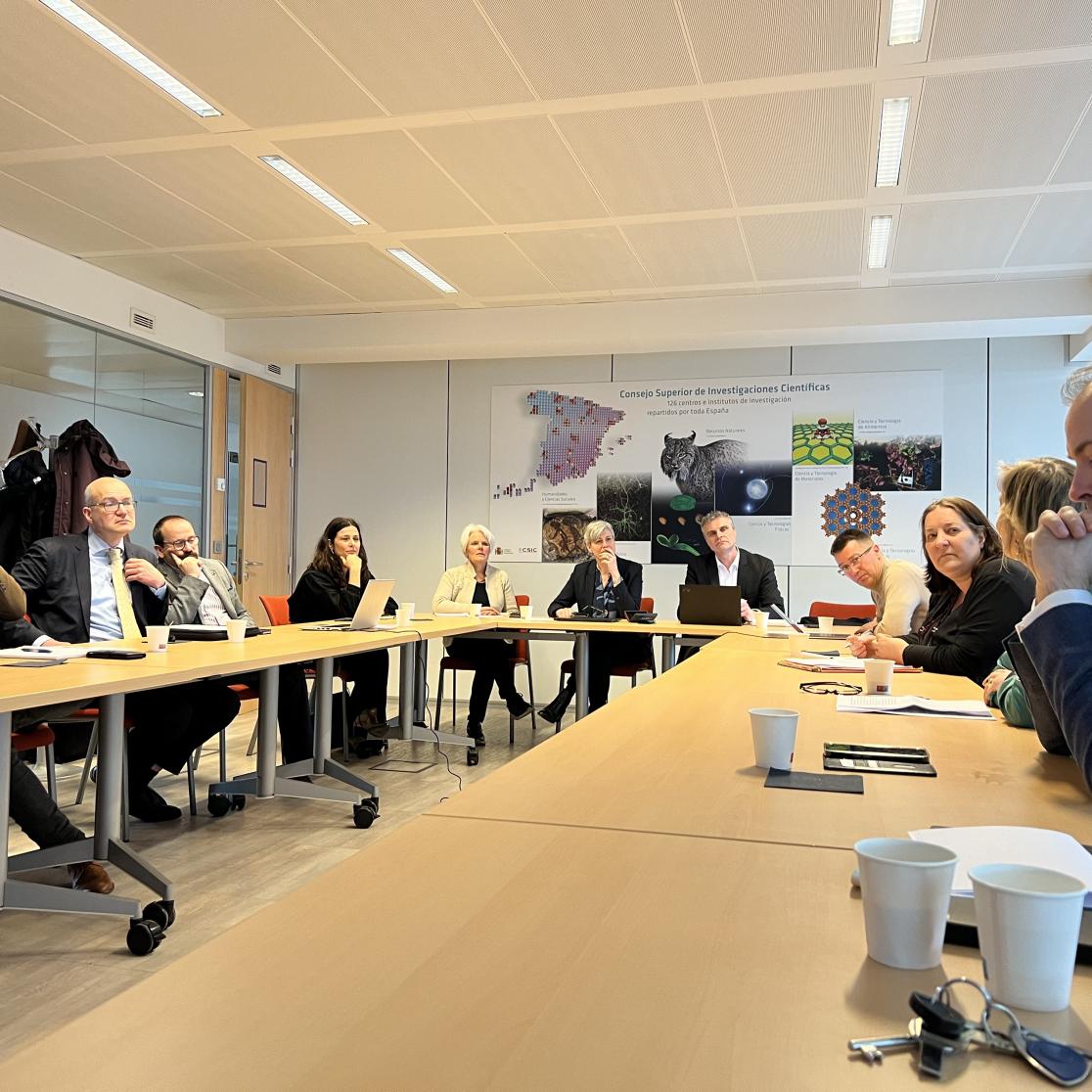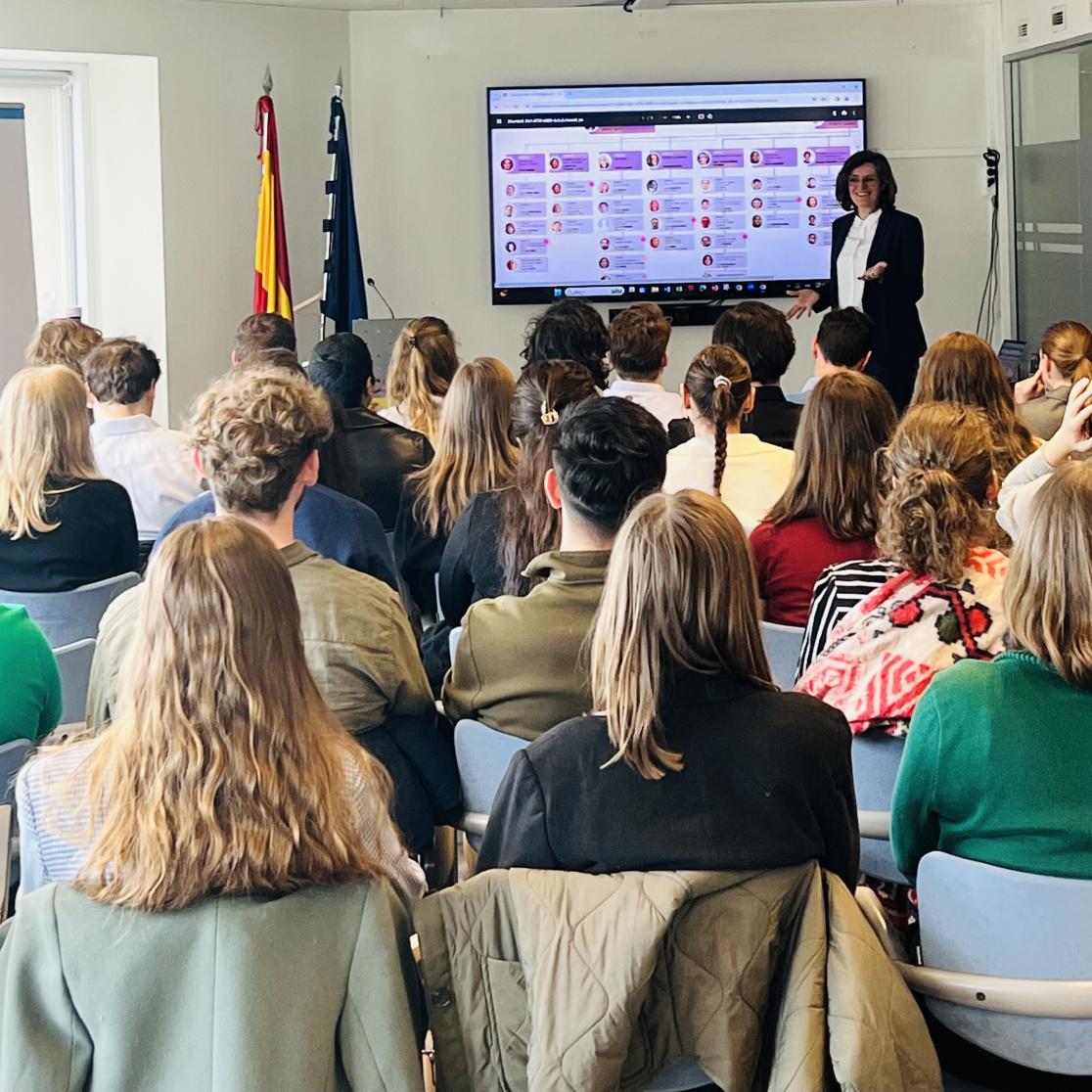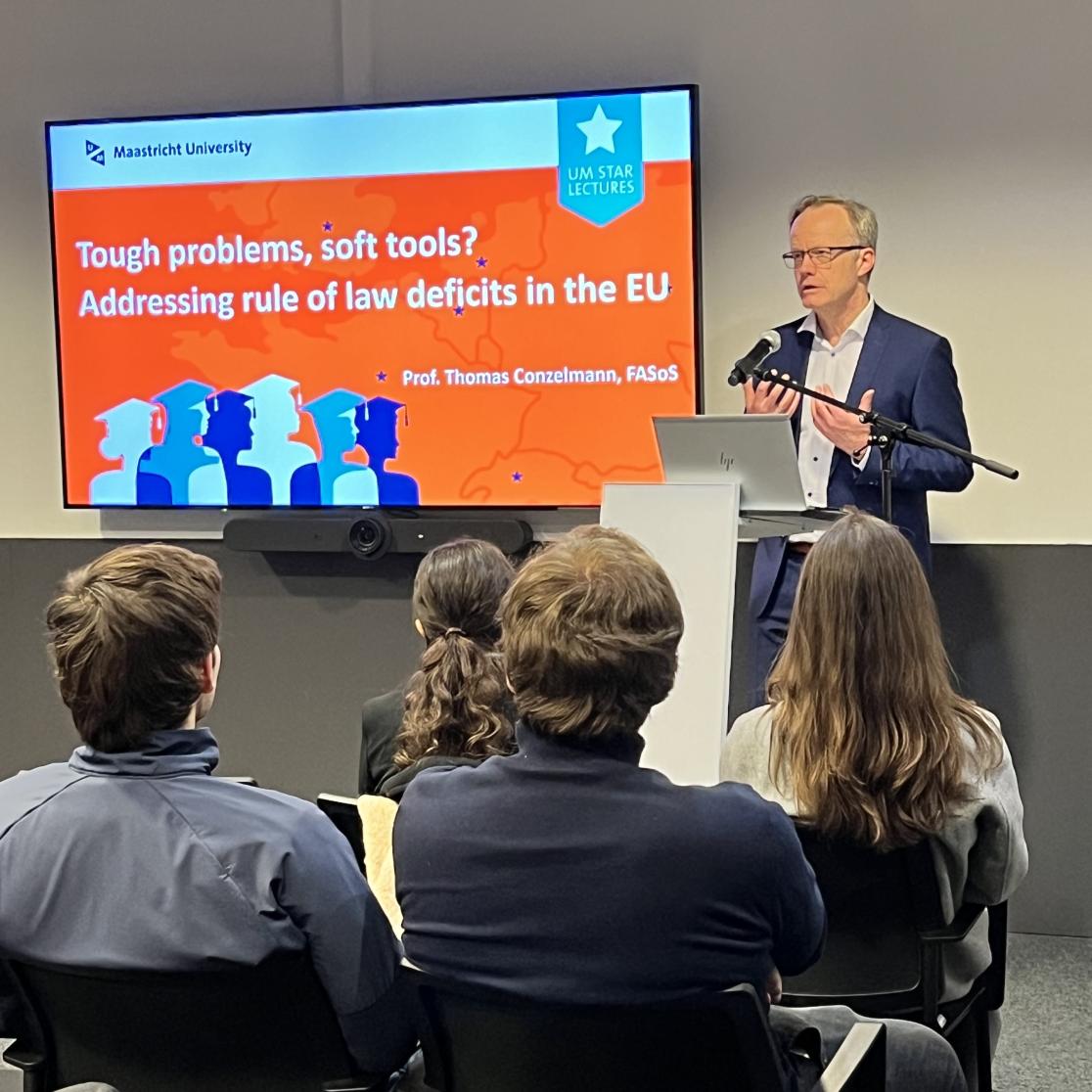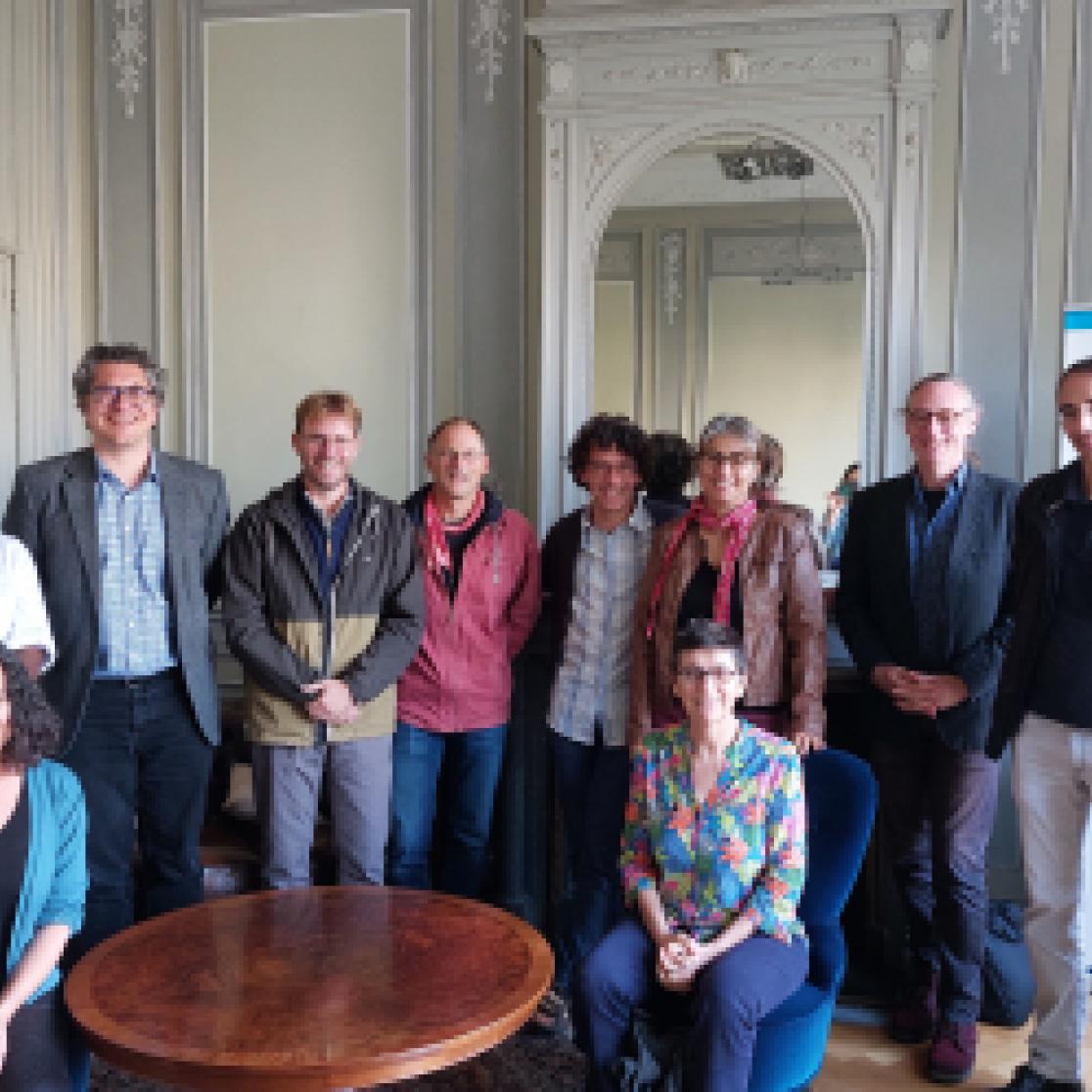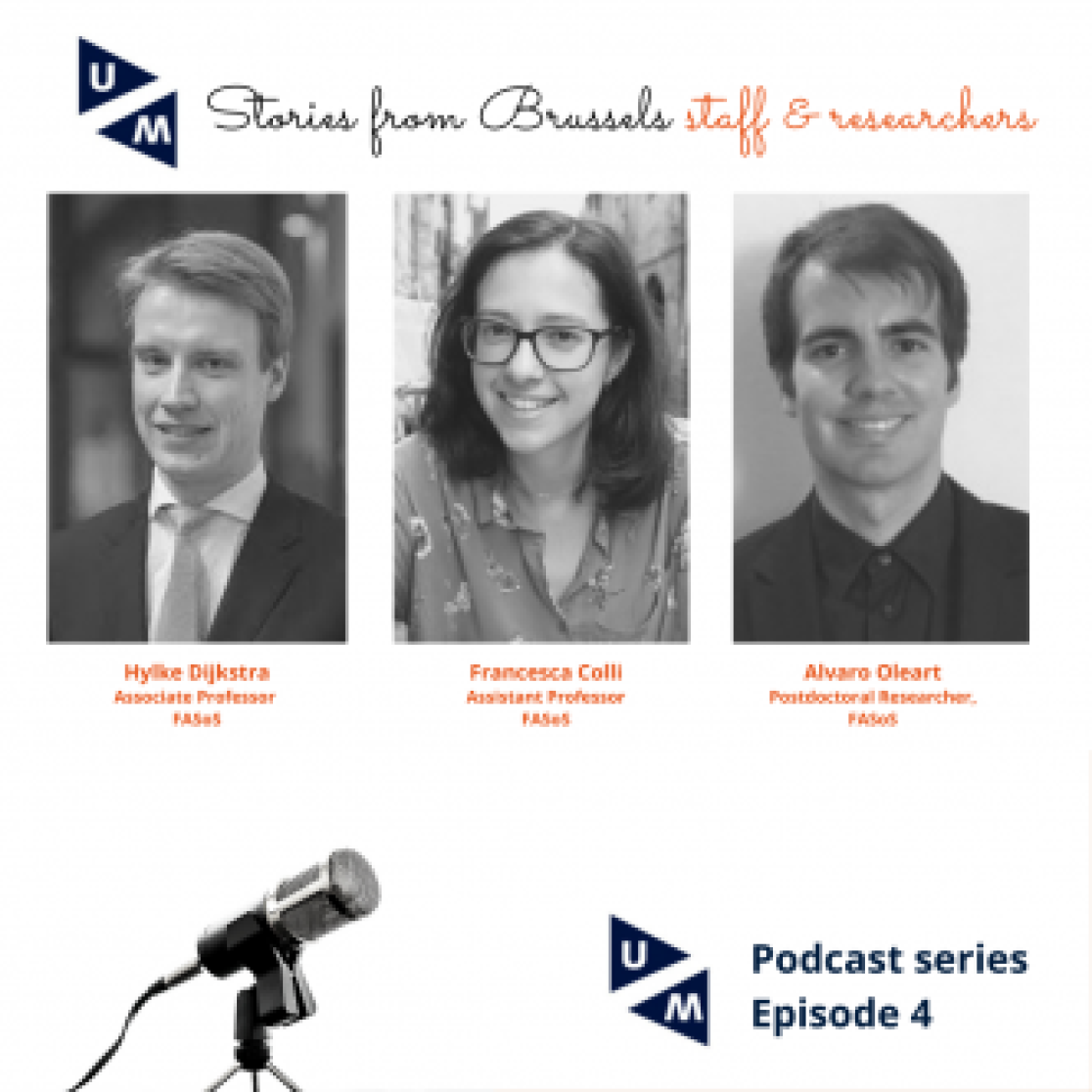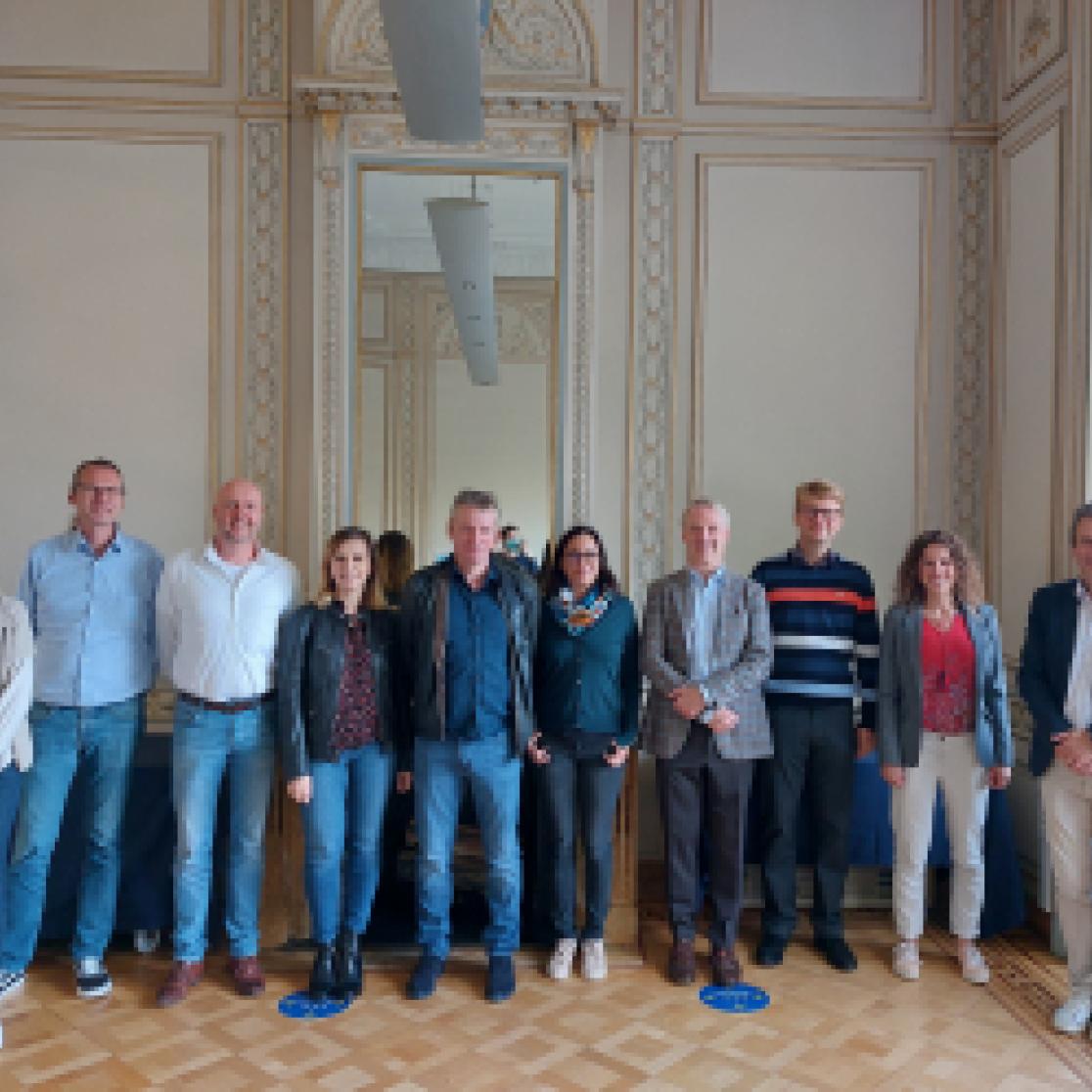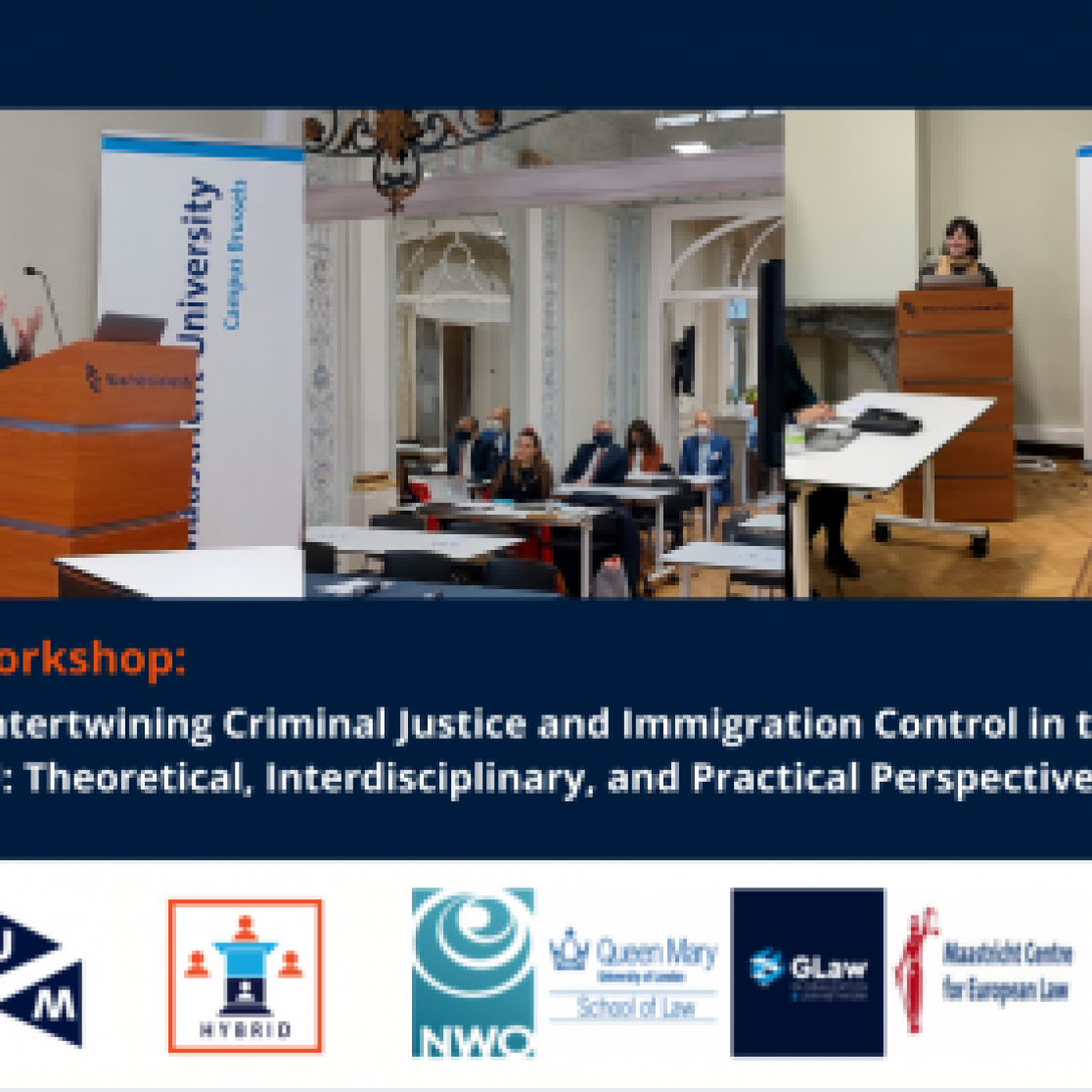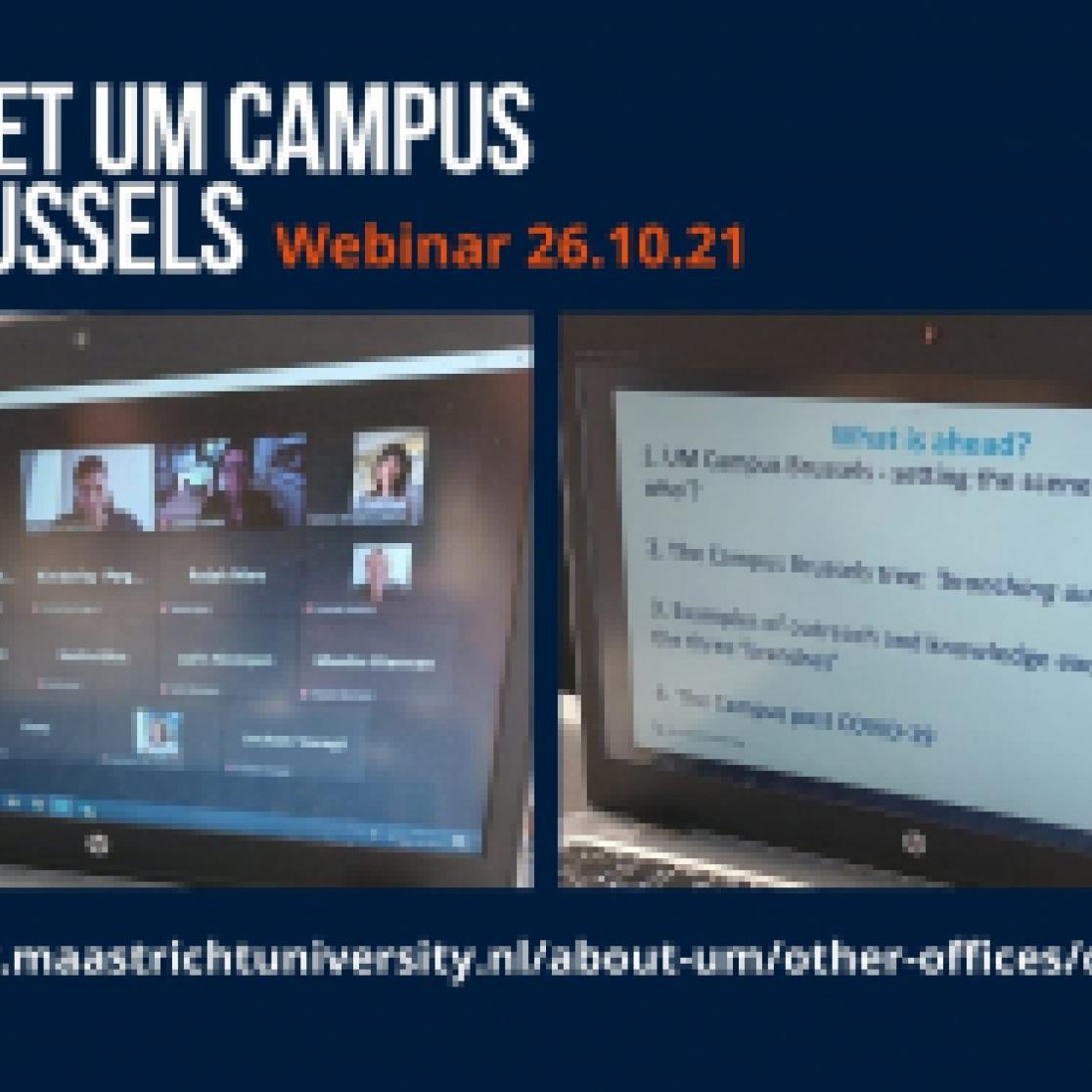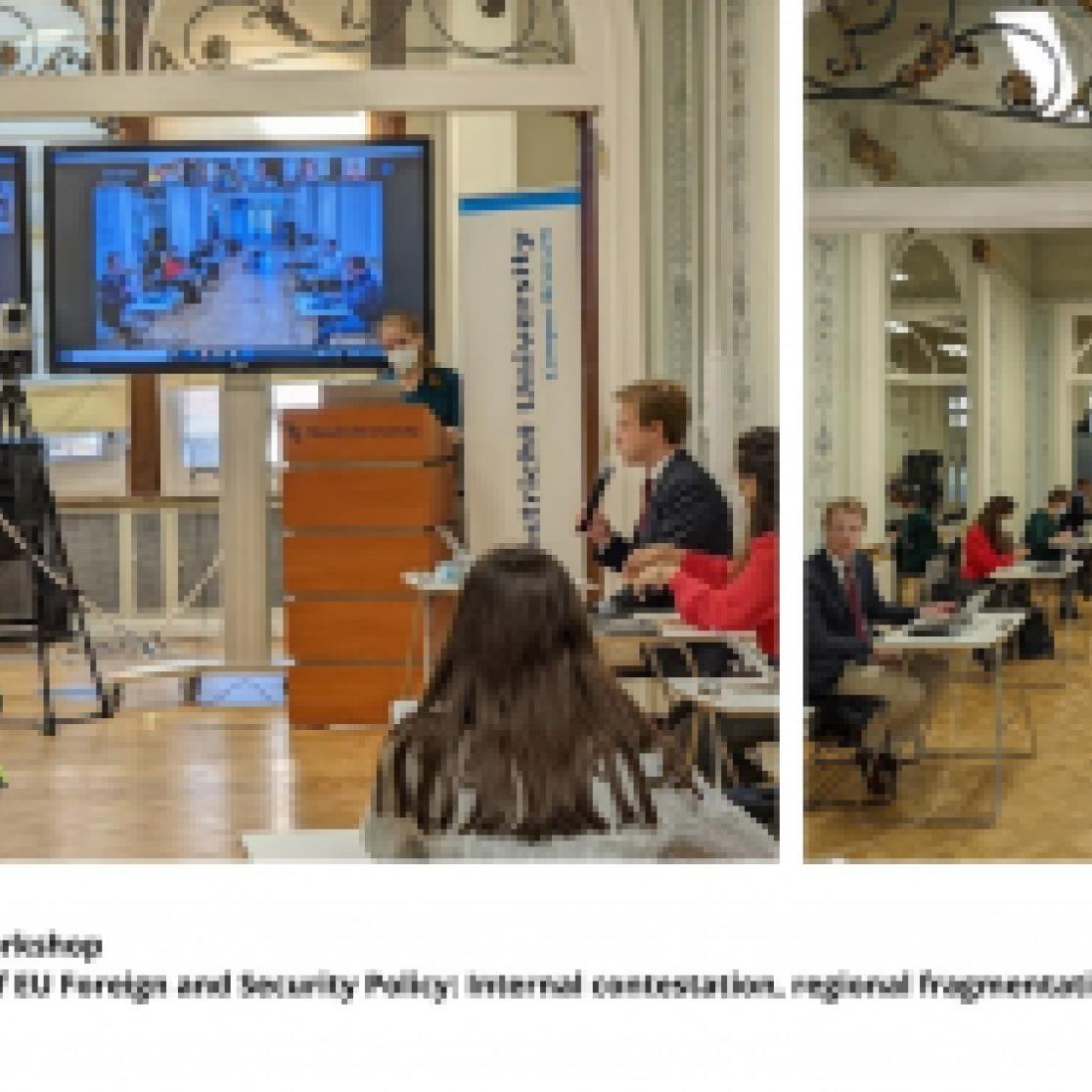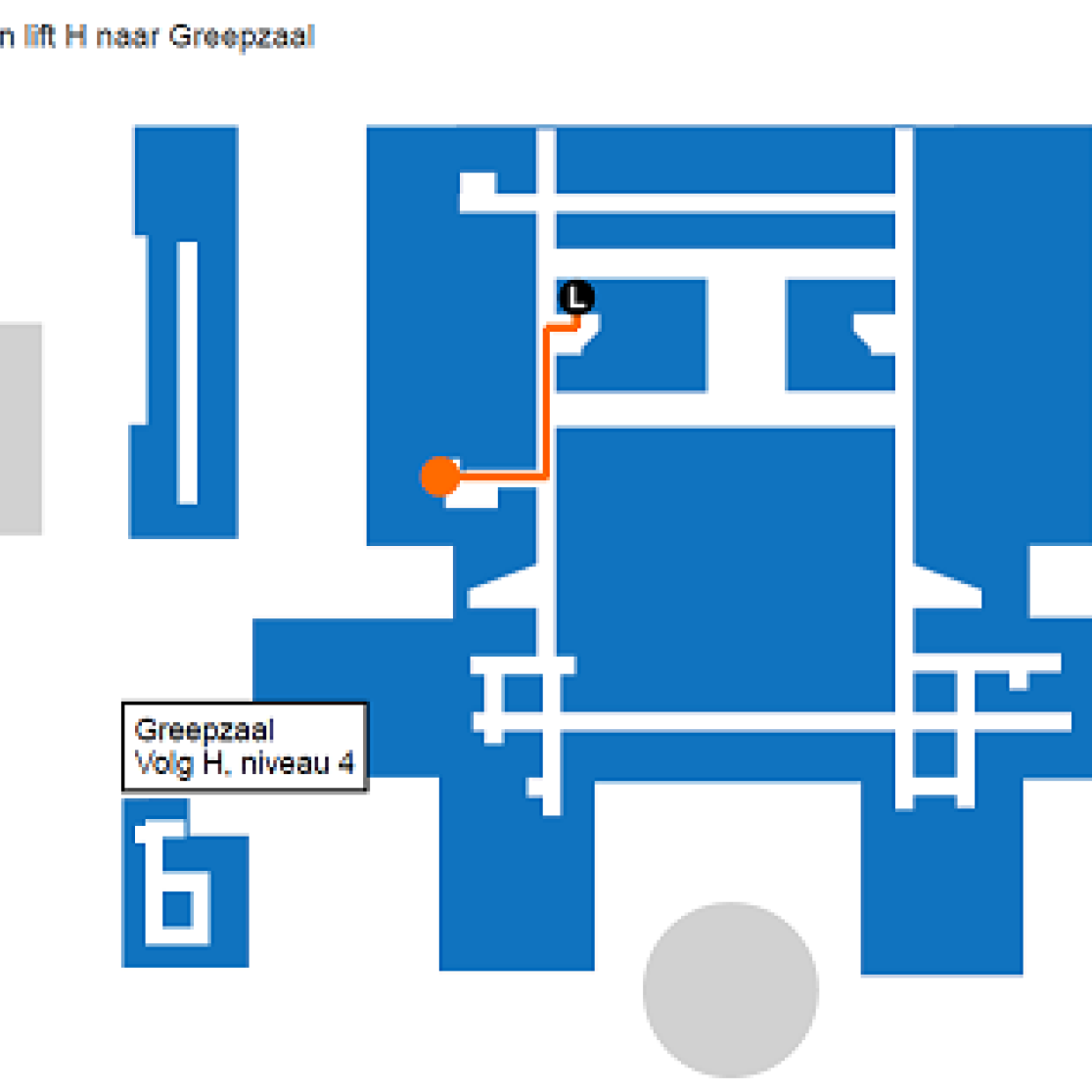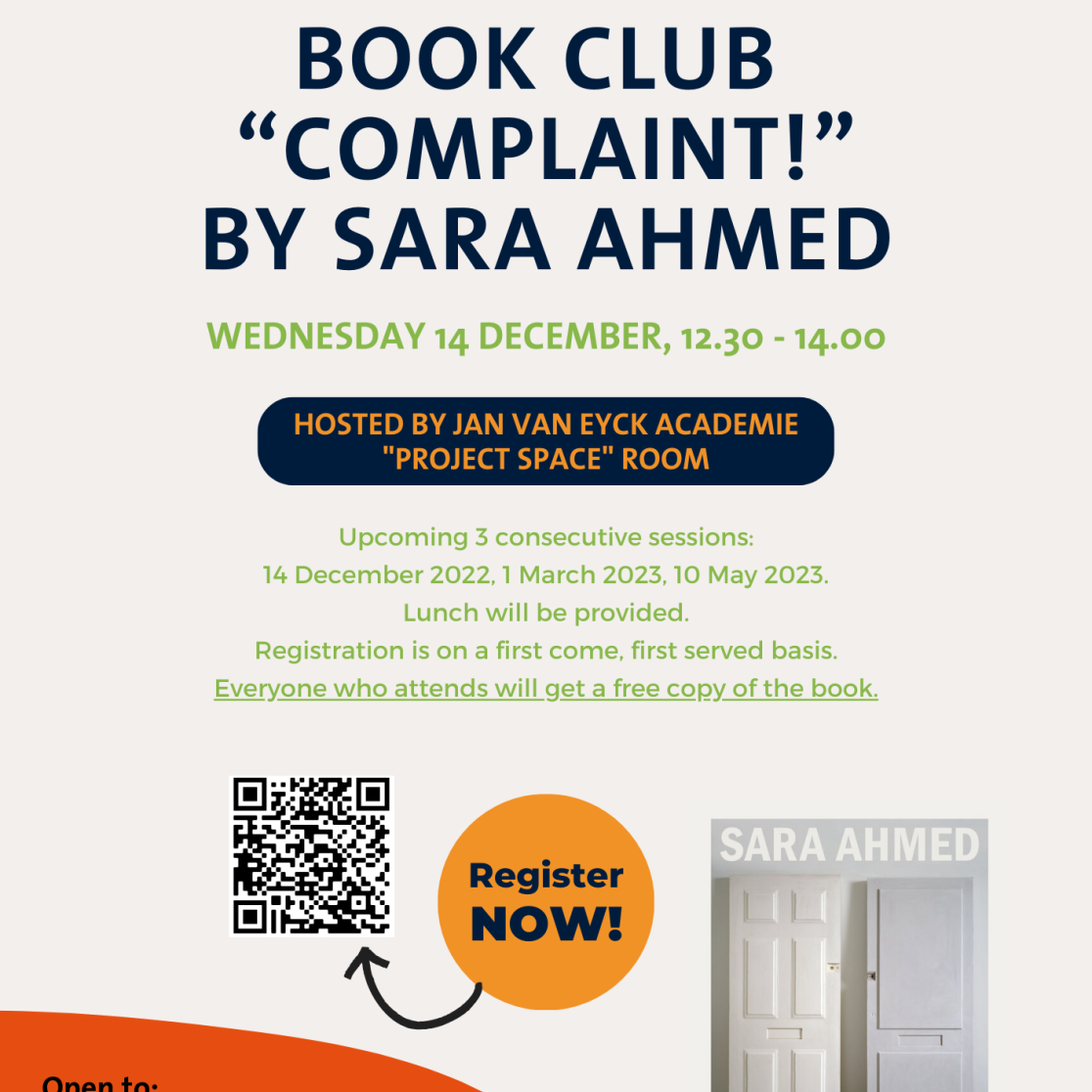Given the interdisciplinary nature of women- and Genderstudies, this was to be an interfaculty centre, headed by a professor. The university board and council accepted this proposal, so the IVO went ahead and produced a detailed profile for the Centre and its professor/director the next year. The hand of Mineke Bosch is clearly visible in this document, who had a teaching position at the Faculteit Cultuurwetenschappen at the time. It just so happened around the same time that the feminist magazine Opzij wanted to sponsor a chair in women- and Genderstudies and was looking for a suitable institutional context in which this chair could be embedded. Bosch played a key role in convincing Opzij that the soon-to-be Centre at what was now called Universiteit Maastricht would be an ideal setting for this chair.
Picture: Outing of the Interfacultair Vrouwenstudies Overleg (IVO), in the front row, from right to left: Ria Wolleswinkel, Maaike Meijer, Hans Philipsen
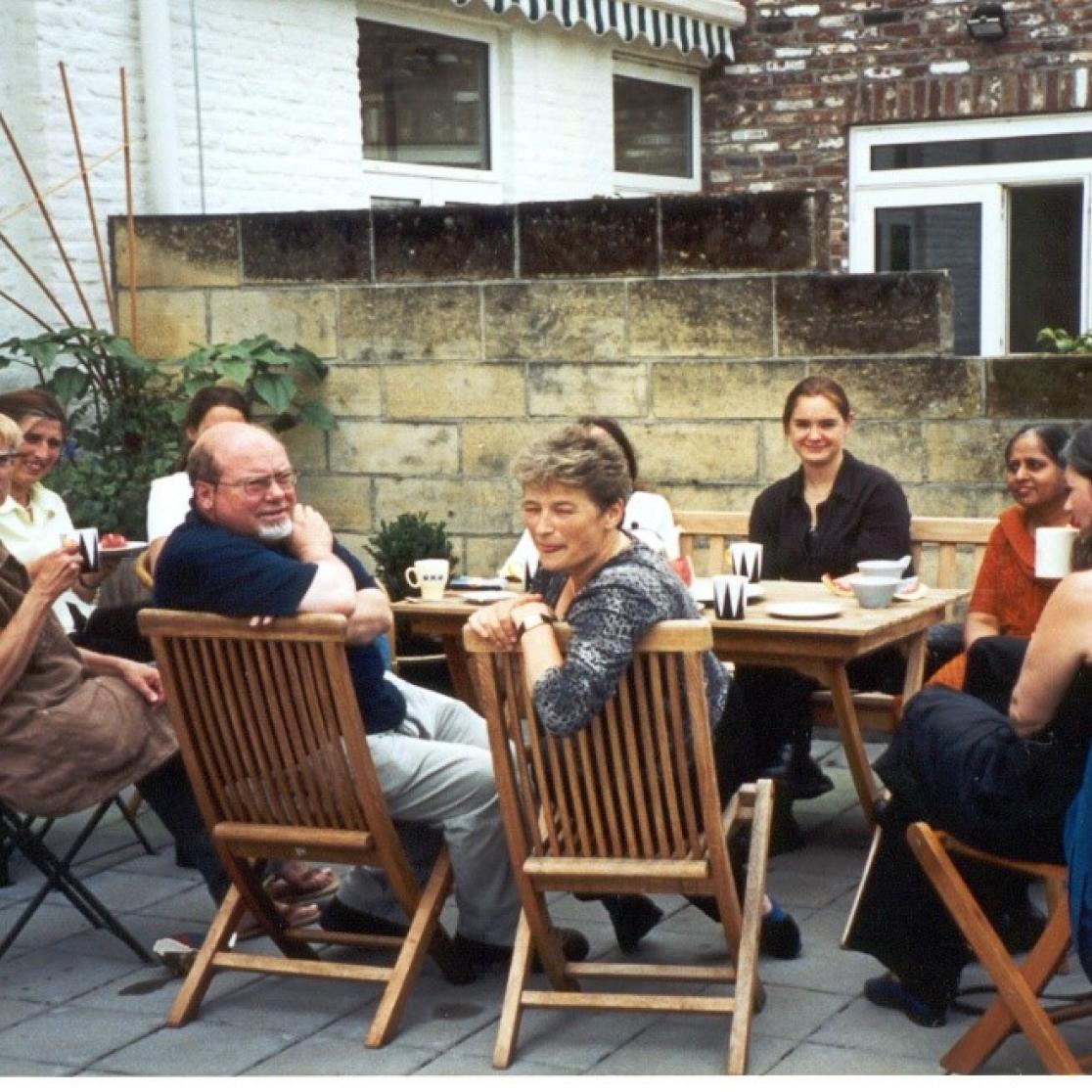
Start-Up and Take-Off: Constructing Research Lines, Course Trajectories, and Science Policies, 1998-2005
In 1998, the sun, the moon and the stars lined up in such a way that this centre could open its doors on September 1 with Maaike Meijer as the first holder of the Opzij chair and director, and Mineke Bosch as an associate professor. They decided to drop the term “women- and gender studies” and adopt the name Centre for Gender and Diversity (CGD) instead, in recognition of the importance of intersectionality theory. The CGD committed itself to the twofold mission of stimulating, developing and implementing research and teaching projects in the field of gender and diversity studies at Maastricht University and of engaging in knowledge valorisation (called “maatschappelijke dienstverlening” at the time). In other words, the CGD was to have both a scholarly and a societal focus. Meijer and Bosch managed quite quickly to surround themselves with a staff of teachers, researchers, and project managers, as well as an administrative coordinator, by means of successful grant applications. Meijer devoted herself to analysing gender in (popular) culture, announcing her ambition to turn the CGD into a “Birmingham aan de Maas” in her inaugural speech, which was a tribute to the University of Birmingham’s Centre for Contemporary Cultural Studies, founded and directed by Stuart Hall and Richard Hoggart. Bosch expanded her work on women in science, following up on her dissertation, Het geslacht van de wetenschap: Vrouwen en hoger onderwijs in Nederland 1878-1948 (1994). These two research lines each entailed their own opportunities for knowledge valorisation. Meijer’s work on popular culture easily found its way to broader audiences outside of academia, while Bosch translated her scholarly insights into the precarious position of women at the university into science policy advising. The first initiative of the CGD to improve the position of women in science concerned UM itself. At the time, it was painfully clear that women scientists at Maastricht University filed a significantly lower number of research funding applications than their male colleagues. Moreover, statistics also revealed that the percentage of research funding applications submitted by Maastricht academic staff generally lagged behind those of their colleagues affiliated to the older Dutch universities in the coastal region.
The CGD decided to kill two birds with one stone by setting up the Onderzoeksatelier V/M in 2000, staffed by Maaike Meijer and Margo Brouns, which offered coaching for female applicants and elaborate feedback on their applications-in-progress. Male colleagues could also profit from this service if they so wished. These days, every university has its research support staff and feedback systems for improving research funding applications of its academic staff. Back then, applicants were mostly reinventing the wheel for themselves, so the Onderzoeksatelier V/M was a complete novelty. It also launched the occasional event, such as the annual Grote Geld Dag, which provided UM researchers with an up-to-date overview of available research funding, including its conditions and procedures.
Picture: The start of the CGD, sitting in the window sill, from right to left: Mineke Bosch, Maaike Meijer, Chantal Dijkman (coordinator)
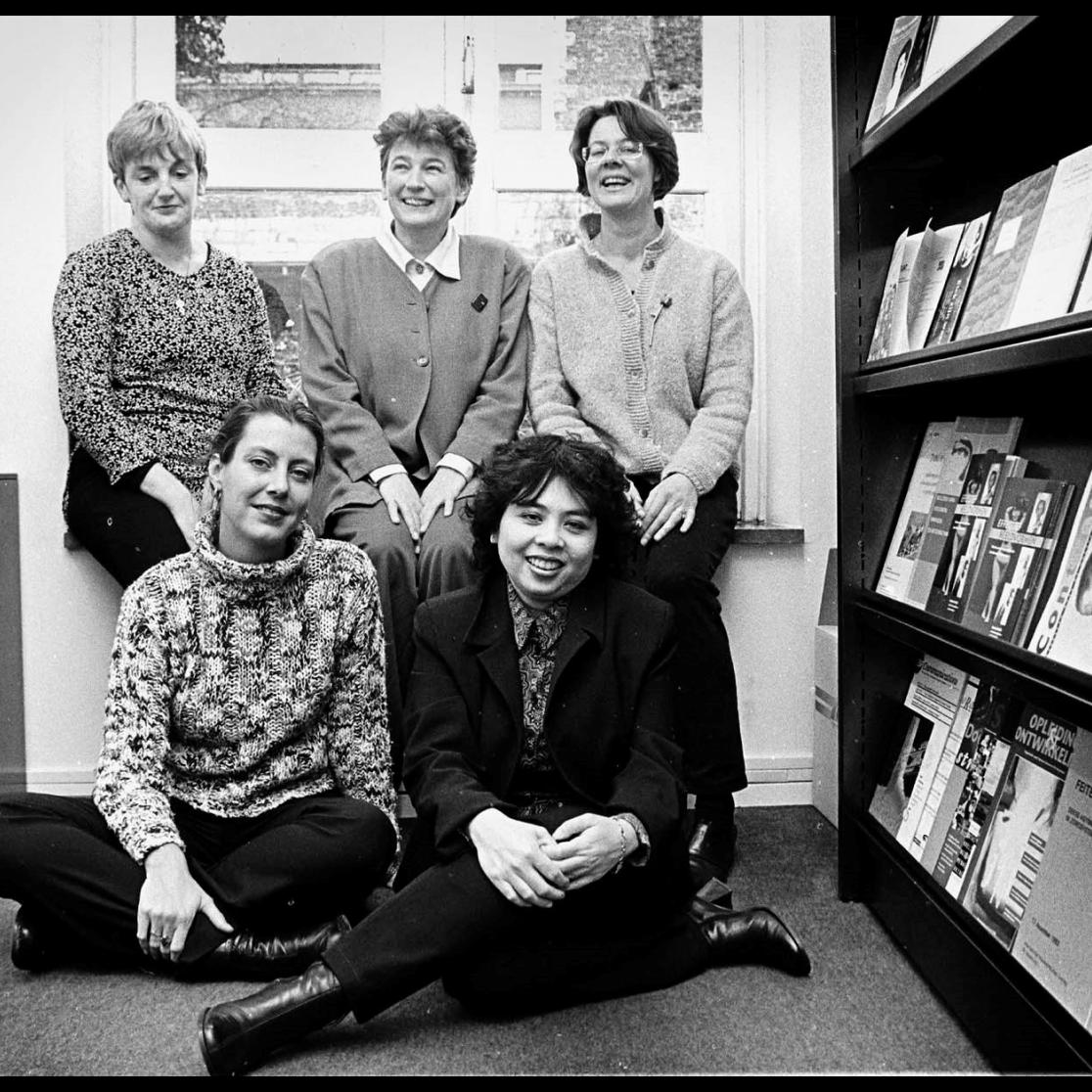
The CGD did not limit itself to Maastricht University, but also concerned itself with the underrepresentation of women scientists in the higher ranks of the university Europe-wide. Mineke Bosch managed to obtain funding from the European Science Fund for improving the gender policies of European universities. Consortia with national and international partners were constructed and the projects Equal I Doorbreking van de Genderkloof (Bridging the Gendergap) (2002-2005) and Equal II Participatie van vrouwen als prioriteit voor wetenschap (Participation of Women as a Priority for Science) (2005-2008) were launched.
The grants enabled the hiring of Akke Visser and Annelies van der Horst to help with the implementation of the projects. The EQUAL projects were strongly focused on disseminating best practices of gendermainstreaming, by publishing best practices guides such as Mainstreaming Gender and Diversity at Universities: A Guide to Good Practices from a Transnational Equal Project (Mineke Bosch, Ester Barberá, 2004) the Equal Guide on Gender Mainstreaming (2004, European Commission). But the EQUAL projects did much more than publishing guides and policy advice. They also organized public events such as the Women in Science and W.I.S.E.R. festivals, and put out posters that visualized the underrepresentation of female scientists on a yearly basis under the heading, Man, daar schrik je van! (Man, this gives you a scare!)
Picture: Mineke Bosch during the W.I.S.E.R. festival
Bosch also struck up a fruitful alliance with Dr. Ineke Klinge of the Faculty of Health, Medicine and Life Sciences, which resulted in a string of externally financed projects for integrating ‘gender’ into the life sciences. They kicked off with a critical assessment of gender on the success of research funding applications, which was funded by the Fifth Framework of the European Commission and resulted in a set of recommendations for overcoming gender bias in research funding that were widely read and applied (Ineke Klinge and Mineke Bosch, Gender in Research: Quality of Life and Management of Living Resources, 2001). The European Commission (EC) also funded the successor project Genderbasic (2005-2007), which aspired towards including the factor of gender in life sciences research as a standard element. This project interviewed life scientists to gain insight into their successes or failures with including the gender dimension in their ongoing research, and it produced a rich array of publications on gender mainstreaming in the life sciences (see www.genderbasic.nl). This project was branded as a “success story” by the European Commission.
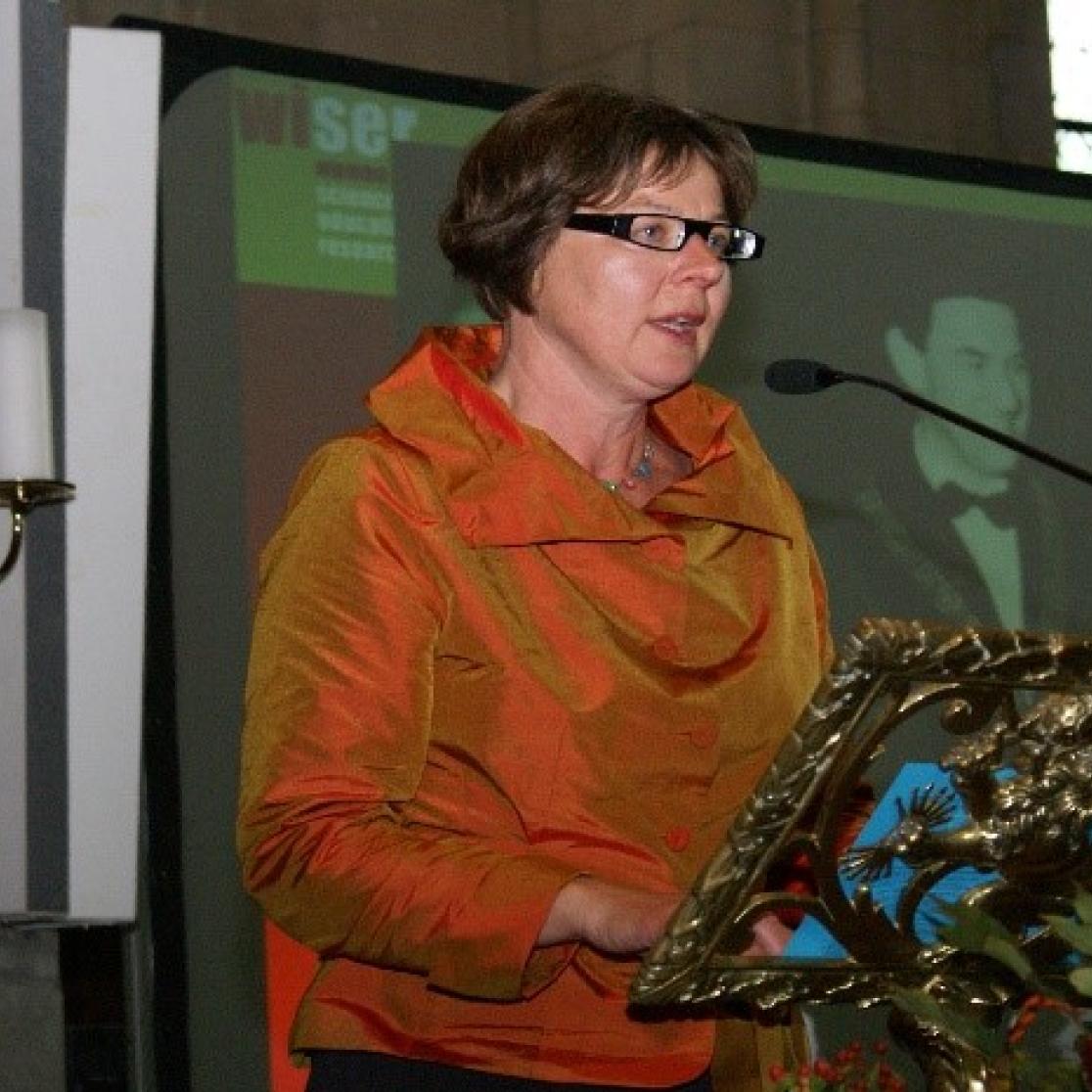
As to teaching, the CGD did not only provide an overview of and a discussion platform for gender studies courses UM wide, but it also developed a substantial number of new courses itself for the newly founded University College Maastricht (2002), as well as a minor in Gender and Diversity Studies for the Faculty of Arts and Social Sciences. The CGD pioneered the didactic format of the international classroom with the course Cultural Diversity in a Global Perspective: The International Classroom, and developed a coherent set of courses in the field of Cultural Studies, that were highly appreciated by UCM students. The success of these courses facilitated the hiring of teachers such as Agnes Andeweg and Louis van den Hengel, who contributed substantially to the quality of these courses.
Even though the start-up and take-off phase manifested a steep ascent, all was not well that went well. While the CGD affiliates were highly productive in the fields of research, teaching and knowledge valorization, its embedding at the interfaculty level was not without its challenges. Sure enough, the periodic interfaculty meetings and outings of UM’s ‘gender fte’s’ were experienced as inspirational, convivial, and festive. But the various faculties to which these colleagues were affiliated were not necessarily interested in or even sympathetic towards gender and diversity studies, nor did the CGD have any administrative instruments for impacting on the power hierarchies of the faculties. This was unsurprising in the ‘postfeminist’ turn-of-the-century climate, when the illusion was rampant that the aims of the feminist agenda had been met. Opponents often asserted that there were more important societal problems than the discrimination of women, such as racism, in blithe ignorance of the fact that these very issues were at the top of the feminist agenda in the nineties, which was shaped by burgeoning intersectionality theory. The author of Alledaags racisme (Everyday Racism, 1984), feminist theoretician Philomena Essed, met with such fierce opposition and personal attacks that she felt compelled to continue her academic career in the US. The contrast to this day and time could not be starker, now that societal activists are once again struggling against the same discriminatory practices that second wave feminists were also up against. In brief, the investment of resources in the CGD provoked professional envy, even at the UM Faculty that the CGD affiliates had the strongest affinity with content-wise: the Faculty of Arts and Social Sciences. The self-study of 2005 reports a “diffuse weerstand tegen de aanwezigheid van het Centrum bij de FdCW” (a surreptitious resistance to the presence of the CGD at FASoS). This phrase also reveals that the positioning of the CGD at the central level of the UM had become an object of reflection and discussion.
Shifting gears 2005-2011
The year 2005 was a turning point in the history of the CGD, as a result of its evaluation by a panel of external experts, which reviewed the period from 1998 to 2005. Both the production of a self-study and the feedback of the evaluation panel provided ample food for thought. The evaluation was highly positive and granted the CGD a 4+ on a scale of 5. The committee felt its appreciation was best summarized in the following passage: ‘Bestaat het Centrum echt maar uit twee vaste wetenschappelijke medewerkers? Het lijkt steeds of ze met veel meer zijn’ (Is the Centre really staffed by two tenured academics only? All the time it seems as if there are so many more of them). The evaluation report convinced the university board that the CGD deserved permanent institutional embedding. This implied that the CGD had to exchange its contract-based interfaculty position for an affiliation to an UM faculty. Given the content of CGD teaching and research, which had a strong humanities profile, this could only be FASoS. Another game changer was the panel’s recommendation to narrow the scope of the CGD’s activities to its academic core business. The CGD’s self-study indicates that this was also their desire, as the knowledge valorisation work did not only entail the publication of reports, but also a whole lot of networking, PR, and public events.
Therefore, the CGD slowly shifted gears. The Onderzoeksatelier V/M was rounded off in May 2005 with a systematic dissemination of its best practices to the various faculties of UM. Faculty-based research policy advisors carried on its work from that point onwards. Equal I was rounded off in 2005 with the projection of the movie The Mind Has No Sex, one of its outputs, but this work was continued for two more years with Equal II, and that was the last big international, externally funded policy project of the CGD. Funding applications became increasingly focused on research projects for PhDs and postdocs. A considerable amount of energy was invested in thinking through the ins and outs of the CGD’s “indaling” (descent) into FASoS, which finally became a fact in 2009.
This changed the mission of the CGD considerably. Given its success in research funding applications, it was decided that the CGD was to become a faculty-based research centre, committed to designing and implementing externally financed research projects that had to more or less match the funding that FASoS invested in the CGD. Investments in European science policies came to a definite end with the departure of Mineke Bosch in 2008, who became a full professor of modern history at the University of Groningen. Maaike Meijer continued for two more years as director of CGD, and was then succeeded by Lies Wesseling.
Picture: The CGD joins FASoS, a festive celebration, front right: Jo Ritzen, Maaike Meijer
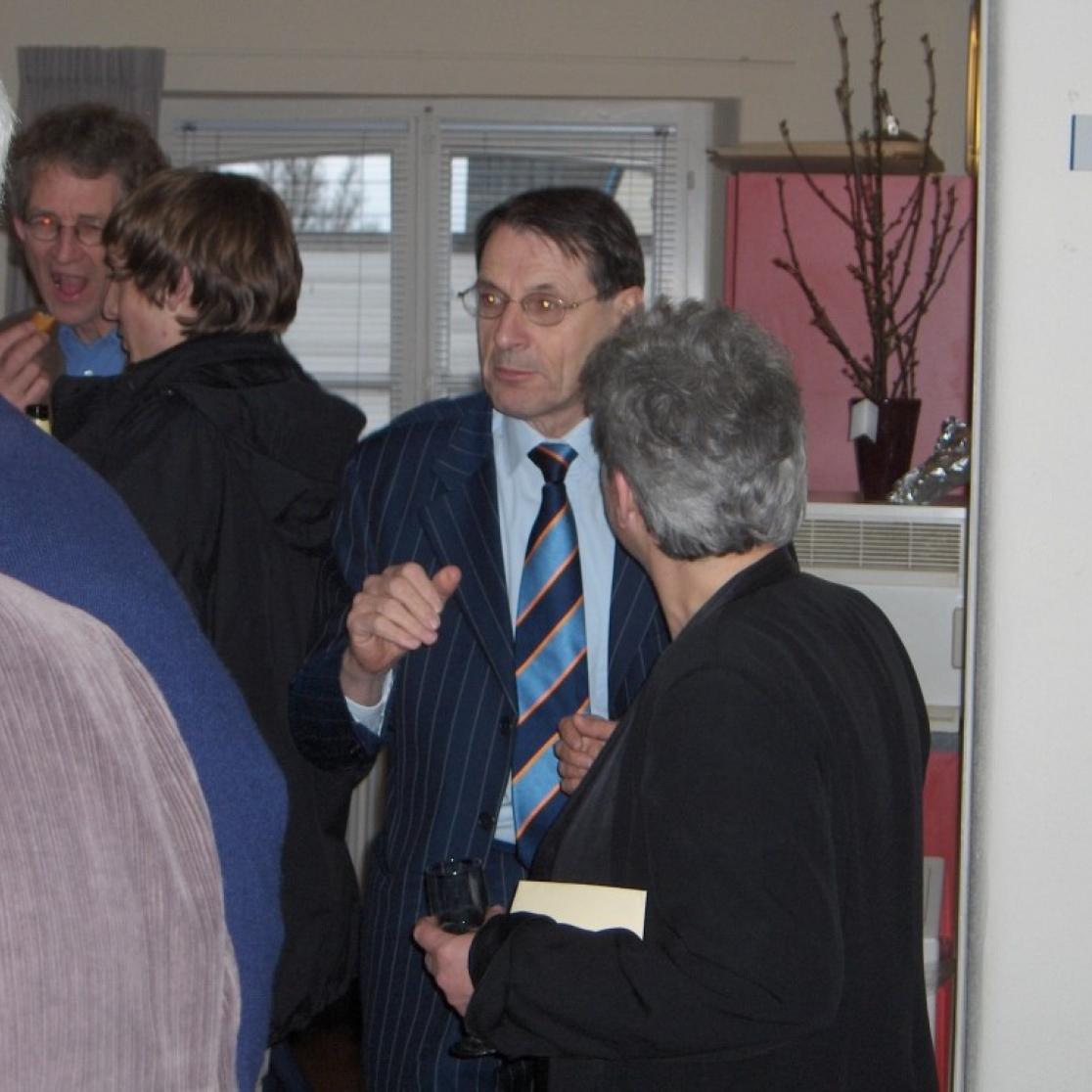
Landing: An International FASoS Research Centre 2011-2022
Now that the CGD had consolidated its academic core business, it focused fully on teaching, publishing and research publications. This was a period in which FASoS changed its research policies by placing a strong emphasis on the acquisition of externally funded research projects and peer-reviewed publications in international academic journals.
This also imposed a strong imperative on the CGD to internationalise, not so much in the sphere of policy and knowledge valorisation, but in academic research itself. This decade was devoted to doing just that. A very important move in this process was the acquisition of external funding for establishing international networks. Aagje Swinnen, Ulrike Brunotte, and Lies Wesseling exerted themselves to found and lead networks in age studies and religion studies that could put CGD research on the map internationally.
Picture: Taking leave of Maaike Meijer as director of the CGD with a festive symposium; standing, to the left of Maaike: Agnes Andeweg
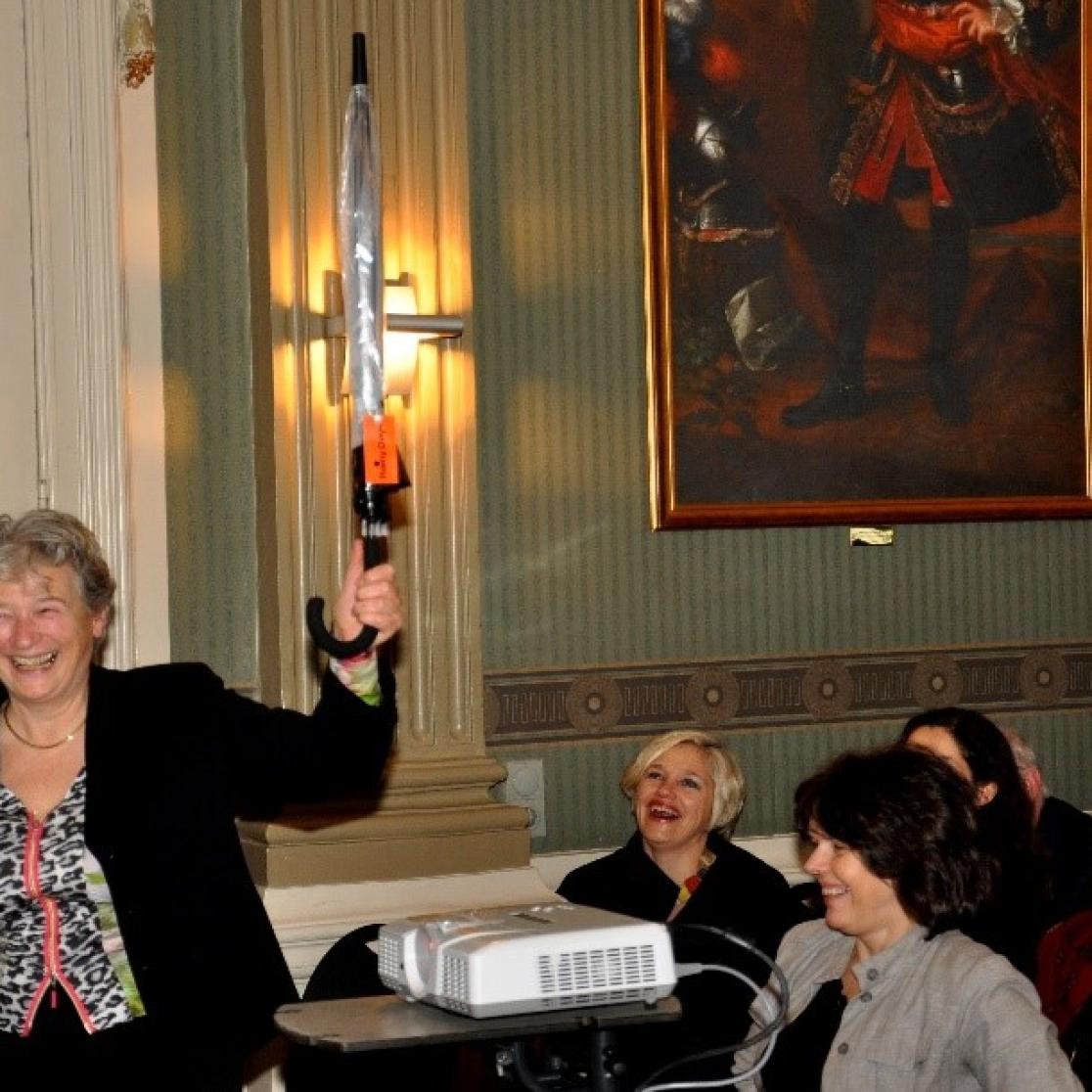
Swinnen founded the network the European Network in Aging Studies (ENAS), as a sister organisation for NANAS, the North- American Network in Aging Studies. The CGD hosted its inaugural conference in October 2011. ENAS now has a biannual internal conference, a mentorship program, two awards, summer schools and The Aging Studies Book Series plus Age, Culture and Humanities: An Interdisciplinary Journal (in collaboration with the North American Network in Aging Studies), with Swinnen as one of its editors.
In 2013, the CGD, together with FASoS, hosted the biennial conference of the International Association for Children’s Literature. Lies Wesseling also joined the board of IRSCL from 2011 onwards, for 10 years, as congress convenor, secretary, president, and past president. Lies Wesseling founded the Platform for an International History of Children’s Media, which published three edited volumes and a special issue for the Journal for the History of Childhood. Ulrike Brunotte founded a network on Gender in Antisemitism, Orientalism, and Occidentalism, which put out three edited volumes. The CGD hosted various preparatory seminars of these networks, as well as the summer school of the International Association for Religion and Gender IARG.
The CGD also supervised both externally funded and self-funded PhDs in this period, resulting in 14 graduations in this decade.
Once again, the times, they were a-changing. While the CGD was the first research centre at FASoS and was experienced as something of a Fremdkörper as such, distributive justice soon kicked in with the development of five research centres in all, whose funding and missions had to be levelled out. The research centres were first of all tasked with the mission of knowledge valorisation, to distinguish them clearly from the four interdisciplinary FASoS research programmes (Arts, Media and Culture; Politics and Culture in Europe; Globalisation, Transnationalism and Development; and Science- and Technology Studies). In a way, this sent the CGD back to square one, which, however, had come to be occupied by the establishment of the Diversity and Inclusivity Office at the central level of the university, fully devoted to the development of emancipatory science policies. This was another major change, which substantially contributed to the mainstreaming of gender and diversity studies and policies.
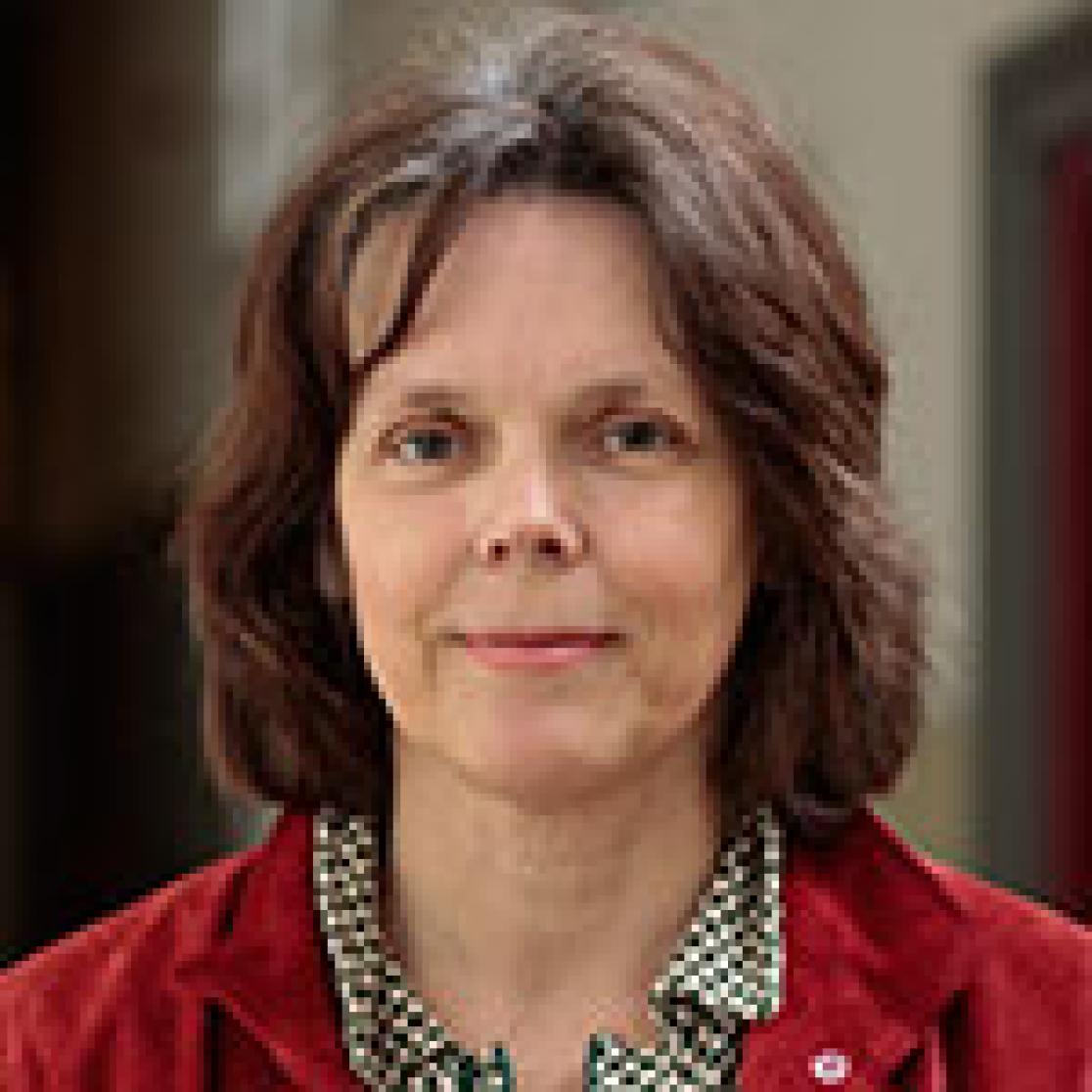
While the CGD had taken off in a post- if not anti-feminist cultural and political climate in which one had to handle the f- and g-words quite gingerly so as not to dispel students and colleagues, it now finds itself in a situation where almost everybody appears to be eager to profile themselves as feminists. Logically, this also boosts the number of colleagues whose research and teaching includes gender- and diversity perspectives, and for whom the CGD can provide a platform and home base. How precisely this new phase will look like under the leadership of its new director, Eliza Steinbock, only time can tell.
The CGD is looking forward to its 25th year anniversary in September 2023, which will be a fine occasion for looking back on its past achievements. We are grateful that the CGD is still alive and kicking. Our past history shows that this has required a good deal of flexibility, of continual adaptation to our own progressive insights, to ever changing managerial imperatives, and to a radically changing political climate. Such flexibility is feasible if one shares a stable core to tap into. The CGD takes its inspiration from the shared source of feminist theory, more specifically intersectionality theory, and from its ongoing engagements with a broad range of societal partners.
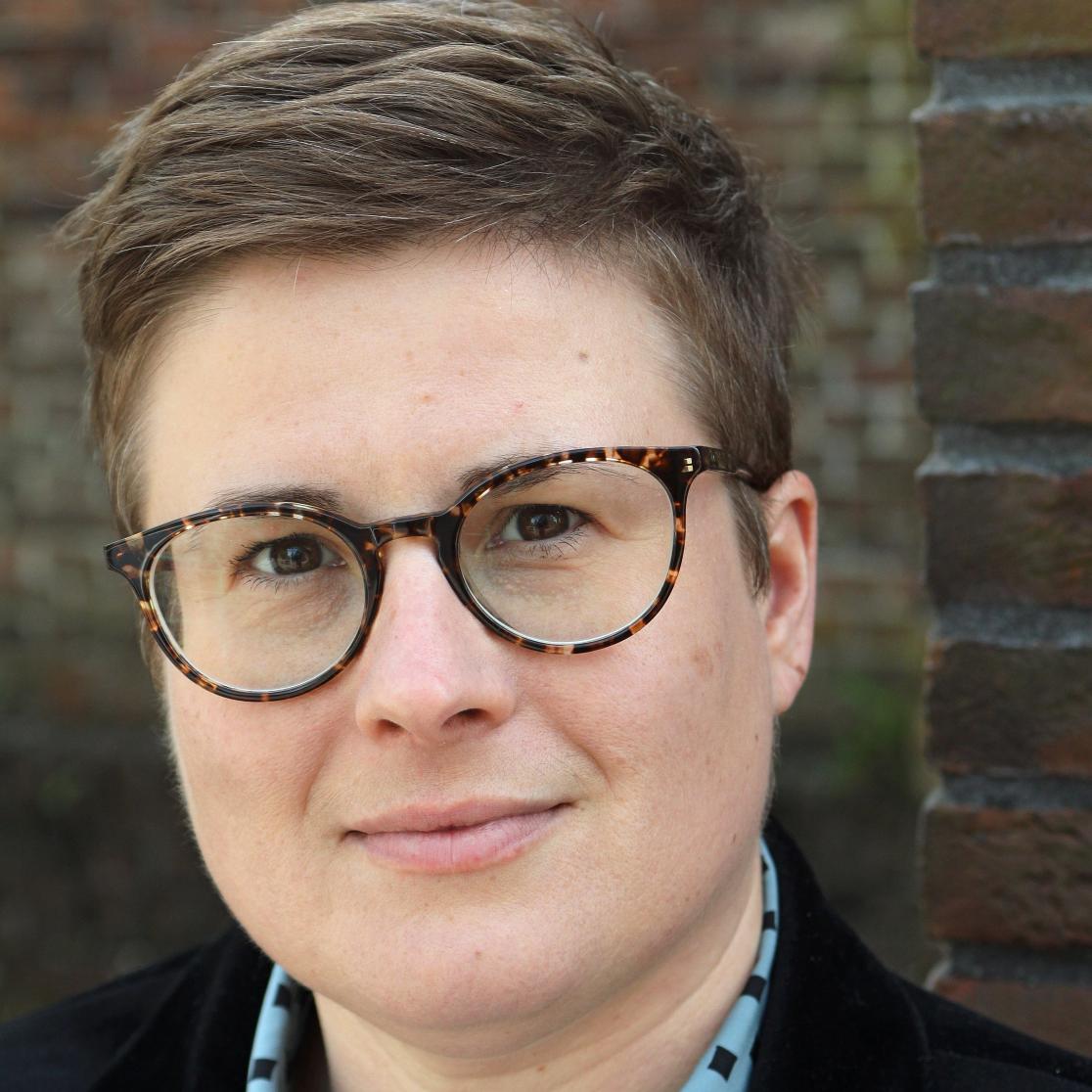
Prof dr Lies Wesseling, former director 2011-2021
January 2023
